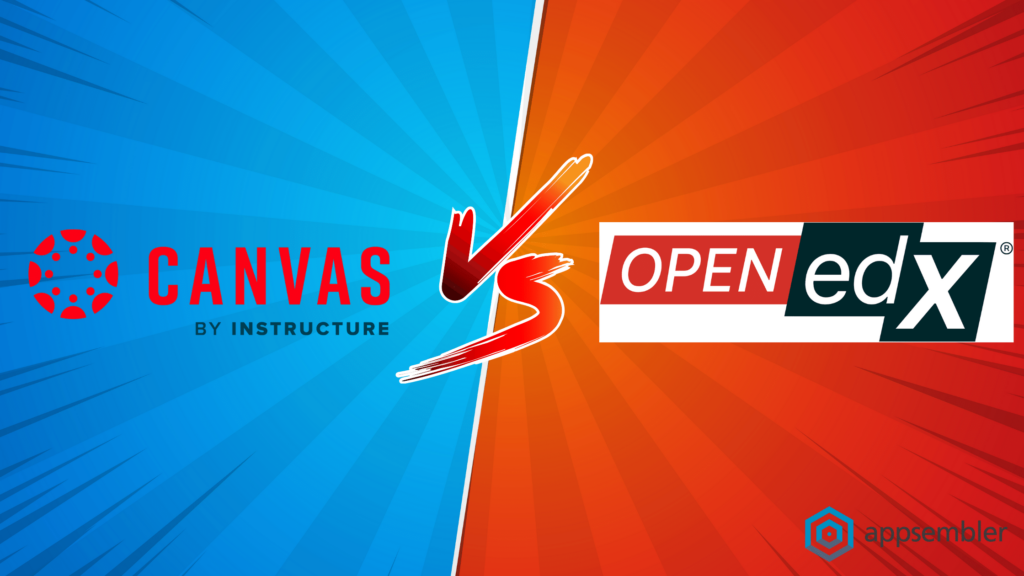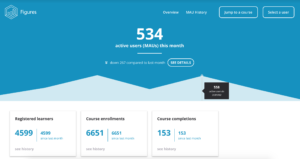Are you considering switching to another LMS because you’re currently paying for features you don’t use?
Perhaps your current one does not have adequate tech support or can’t handle the growing number of users and courses. Maybe you’re looking for a platform to accommodate your specific course formats and integrate with your current tech stack.
Open edX and Canvas can address these challenges. Both are open-source, highly customizable, and used across many industries.
However, choosing the right platform requires a deep dive into your specific needs and how these platforms can meet them.
In this article, we’ll unpack the pros and cons of each platform so you can decide whether they’re a right fit for you and your team.
But first, here are the key things to consider when choosing the right LMS for your organization:
- Integration capabilities: Consider whether the LMS can integrate with other systems or platforms your organization is already using.
- Scalability: As your organization grows and training needs increase, the LMS should be able to accommodate this growth without limitations.
- Customization options: Choose an LMS that allows you to customize branding, create custom certificates, and tailor course content to match your company’s style and tone.
- Customer support: Consider the level of customer support the vendor (and its community) provides. Look for a system that offers various forms of support, such as phone, email, or live chat.
- Pricing: Some systems charge a flat fee, while others have a subscription model or charge per user. Carefully evaluate the true cost of an LMS.
Table of contents
Open edX vs Canvas Comparison Overview
Open edX | Canvas | |
G2 Rating | ||
Pricing | Free | Free and Paid Plans |
Customization | Highly Customizable | Customizable with Limitations |
Integrations | Extensive Integrations | Integrations Available |
Support | Large and active open-source community | 24/7 support |
What is Open edX?
Rating: 4.0/5.0 (G2)

Open edX is a flexible and scalable LMS born from a collaboration between Harvard and MIT. It enhances the overall learning experience and course uptake by promoting active learning and engagement.
As an open-source platform, Open edX provides high customization, making it a versatile choice for various industries—from the academe to government and corporate training.
Open edX’s offerings constantly evolve thanks to innovation from multiple technology partners like Microsoft and Google.
What is Canvas?

Rating: 4.4/5.0 (G2)
Created by Instructure, Canvas primarily caters to the academe. It serves as a central hub for all types of learning environments, including online, hybrid, and in-person classrooms.
Canvas has a no-cost version called “Free for Teacher,” which is an excellent option for individual educators and content creators. Paid plans are also available for larger accounts such as schools, colleges, and universities with multiple teachers.
Canvas has a customizable interface, however, it falls short in terms of customization compared to Open edX.
Open edX vs. Canvas: Key features
When choosing the right LMS, look beyond its features. Find out whether they offer value for money, lend you flexibility, work well with your current tech stack, and provide several resources.
Let’s tackle each platform in-depth and find out how they fare in terms of pricing, customization, integration, and support.
Open edX vs Canvas Pricing
While both are open-source platforms offering free features, certain costs are associated with creating and running your courses on Open edX and Canvas.
Open edX Pricing
While technically “free” because it’s open-source, the true costs of hosting Open edX all by yourself involve people and hosting costs.
Running an Open edX platform requires a dedicated support team with extensive technical knowledge. You’ll need to set aside a budget for people costs to hire in-house specialists or independent contractors: software engineer, DevOps engineer, web designer, and project manager.
You’ll also need to shell out money for hosting the platform, regular updates and maintenance, customization, and integration with other systems.
That said, you can use a third party to host your Open edX environment and avoid these extra costs. Not to mention the ability to save time and effort in hiring an internal team to run the platform. You can pay a monthly subscription to a fully managed service partner who handles hosting, maintenance, updates, and customization.
This is what Appsembler does—essentially giving you the best of both worlds. You can access an open-source platform without additional overhead costs.
Canvas Pricing
Canvas provides a free-for-teacher version with all the basic features. For instance, you can create a free course or download the software to run it on their servers at no charge.
However, the free version may not be able to handle your needs if you’re from a larger educational institution like a university. You’ll need to pay for administrative control, training, and integration support (such as with your existing student information system or SIS).
For an exact price, you’ll need to contact the Instructure team to get quotes based on your institution’s size and needs.
Open edX vs. Canvas Customization
Customization allows the LMS platform to evolve and adapt to your institution’s growth and changing needs. Having robust customization options ensures your LMS can keep pace as your educational strategies, content, and technologies advance.
Open edX Customization
Open edX is arguably one of the most customizable LMS solutions today. Its solid customization capabilities stand out because of XBlocks.
XBlocks are modular components in Open edX that enhance interactivity and engagement in online courses. They’re like Lego; each block serves a specific function and can be combined with others to build a learning experience that’s equal parts comprehensive and immersive.
With XBlocks, the possibilities for customization are virtually endless.
They enable developers to create independent, reusable course components that work seamlessly with other parts of the system. These can range from simple text and images to more complex elements such as interactive simulations or collaborative learning tools.
And the cherry on top? All of them are free.
Open edX also offers various APIs and LTI components that take Open edX’s customization capabilities to the next level. Organizations can modify the platform’s appearance, integrate it with other systems, and create custom platforms.
But note that while Open edX offers extensive customization options, implementing these changes requires a certain level of technical expertise.
Canvas Customization
While Canvas offers a significant degree of customization, it may not provide the same level of flexibility as Open edX, particularly due to the lack of XBlocks.
For instance, some users have expressed that the options for customizing colors, profiles, and class pages are limited, which makes identifying students difficult. Others have suggested expanding the range of colors to personalize and flexibility in design for creating visually appealing courses.
Canvas has an open-source component but primarily relies on pre-built course-level features. For both Free for Teacher and Paid Canvas, you can create the following:
- Announcements
- Assignments
- Discussions
- Grades
- People
- Pages
- Files
- Syllabus
- Outcomes
- Quizzes
- Modules
- Conferences
- Collaborations
- Course Settings
For the free version, you can also have third-party/SSO Canvas authentication with Facebook, GitHub, Google, LinkedIn, Microsoft, and Twitter.
However, you’ll have to pay for custom authentication with any available authentication provider.
The following customizations and templates are available for Paid Canvas:
- Canvas-Enabled External Tools (LTIs) for chat, new quizzes, quizzes tool, roll call attendance, SCORM (assignments)
- Blueprint Course Templates
- Individual Course Templates
- Account and Sub-account Branding (Theme Editor)
- Custom User Permissions
Check this community page for more information comparing Paid Canvas and Free for Teacher features.
Open edX vs. Canvas Integrations
Integration in LMS is one of the key things you must consider. It enables a seamless workflow across your various platforms and tools. Robust integrations make it easy to switch around third-party providers or implement new technologies without the fear of losing data (or manually migrating them.)
An LMS platform with extensive integrations ensures continuity and adaptability.
Open edX Integrations
Open edX offers a vast library of existing integrations, making it one of the most flexible and adaptable LMS platforms available.
Open edX allows users to customize their LMS to meet specific needs—from analytics tools to content libraries and payment gateways.
For instance, you can integrate Google Analytics for in-depth course tracking, add a PayPal payment gateway, or connect to third-party content providers like YouTube or SlideShare.
If a specific integration isn’t available, you can custom-create it. Thanks to Open edX’s open-source codebase, your developers can build custom integrations to connect the LMS with virtually any software or service.
However, if you don’t have the technical expertise in-house, Appsembler can help.
Our team can help overcome common coding and platform challenges. Just contact our technical support team, who will provide smooth and efficient integrations and deployment on Open edX.
Canvas Integrations
Canvas offers various pre-built integrations, from educational tools to communication and collaboration platforms. It supports links to popular tools like Google Drive, Microsoft Teams, and Zoom that greatly enhance the learning experience within the Canvas environment.
However, some users have pointed out limitations in Canvas’ integration capabilities.
Reviews show that while the selection of pre-built integrations is impressive, the platform does not support backend integrations and reporting.
This can be a drawback for organizations with specific integration needs that are not covered by the existing options.
Open edX vs. Canvas Support
Technical support is crucial, especially when we talk about building courses. The availability of support spells the difference between smooth implementation and disruptions. Between high uptime and decreased uptake.
Open edX Support
Open edX boasts a vibrant and active community that’s ready to assist with queries or issues—a massive thumbs up for open-source platforms.
If you have a question or run into a problem, there’s a good chance the answer is already available in Open edX’s extensive documentation or on their forums. These resources are readily accessible, from basic platform usage to complex coding challenges.
However, running an open-source platform also means you’re largely responsible for ensuring uptime, which can be daunting without the technical expertise.
Appsembler offers comprehensive support services for Open edX. It takes the burden of maintenance and uptime off your shoulders. Our technical support maintains over 99% uptime for your platform.
You can rely on your learning environment being always “switched on” and not worry about disruptions during peak hours. This way, you can focus on creating engaging learning experiences, not the technical stuff.
Canvas Support
Canvas provides extensive documentation to help users navigate their platform. Whether you’re an instructor needing guidance on creating assignments or a student looking for help with submitting quizzes, Canvas has detailed guides to assist you.
Canvas also offers a frequently asked questions (FAQs) section where users can explore answers to common support queries. For more technical needs, Canvas provides REST API documentation and an extensive knowledge base.
And did we mention the highly active community forum?
If your question or issue isn’t covered in any of the above, Canvas offers a 24/7 chat and support team with a 99%+ uptime. If you opt for its paid-hosted platform, the Canvas team will also actively work on resolving any outages.
Open edX vs Canvas: Which LMS to Choose
Canvas has undeniably become popular for many organizations due to its extensive pre-built integrations and 24/7 support. It has worked well for many scenarios, more so for educational institutions looking for a high level of uptime.
However, when it comes to customization, scalability, and the ability to grow with your organization, Open edX emerges as the superior choice.
Open edX is an open-source platform that affords near-endless customization options. This means you can tailor the platform to your specific needs, creating a unique and personalized learning environment.
Whether you’re looking to add new features, integrate with specific third-party tools, or scale the platform as your organization grows, Open edX provides the flexibility.
Combine this with an active open-source community, and you’ll have an LMS powerhouse. Imagine accessing a wealth of resources, including extensive documentation and forums, plus constant innovation from tech giants like Google and Microsoft.
While maintaining uptime can be daunting with open-source platforms, partners like Appsembler offer comprehensive support services and maintain over 99% uptime.
So, while Canvas is a solid LMS option for some scenarios, the customization, scalability, and active community support offered by Open edX make it a more adaptable and future-proof choice for organizations looking to grow and evolve their online learning environments.
Trust Appsembler with Open edX
If you’re convinced Open edX is the way to go, know that Appsembler is here to help you run an open-source platform with so much ease and efficiency.
When you partner with Appsembler, you’re entrusting your LMS to experts well-versed in Open edX. Our dedicated team ensures smooth operations, maintains 99+% uptime, and provides round-the-clock support.
The best thing is you won’t have to worry about hiring or training an expensive team of engineers because we are always ready to assist you.
We at Appsembler also believe in pricing transparency. The true cost of our LMS is what you pay for in subscription fees; there are no hidden costs or unpleasant surprises.
You’ll know exactly what you’re paying for, making budgeting and financial planning easier.
By entrusting your LMS to Appsembler, you choose a partner dedicated to providing reliable, efficient, and transparent services. You can focus on what truly matters—creating engaging and impactful learning experiences.



